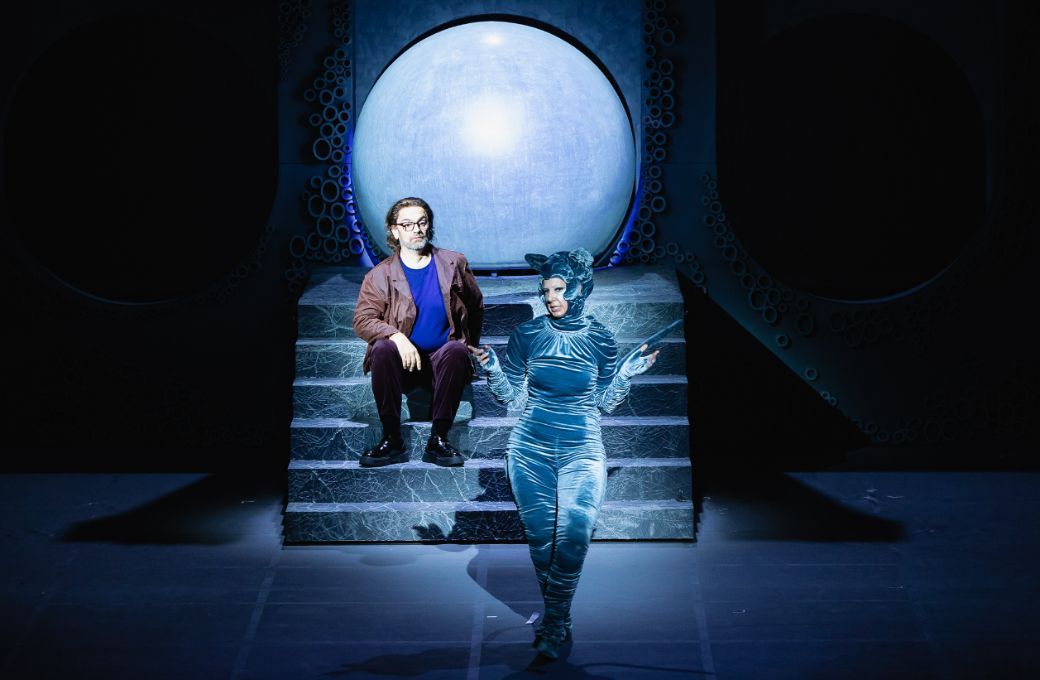Even more than Orfeo, Tosca or Ariadne auf Naxos, The Tales of Hoffmann is the meta-opera par excellence. Male reflections on the impulses to love and to create, and on their mutually inextricable nature, centre on frustrated infatuations with female objects of desire, one after another. The figure of the diva herself being one of those objects, she must die at some length before the curtain falls, just as Offenbach himself never lived to see the premiere, leaving the culmination of his life’s work in a state of some editorial disrepair.

On the borders of art and life, we are all Hoffmann. That seems to be the thrust of the new staging directed for Latvian National Opera by Aik Karapetian, in which all the male chorus are also costumed as Hoffmann, exuding louche metrosexuality on an ingeniously simple set by Miķelis Fišers, updated to roughly a century after the opera’s 1880 premiere. Other modern Hoffmann stagings have played the same trick, in the mould of Claus Guth’s Fierrabras for Zürich where all the male leads were got up as Schubert.
At points in the action, Karapetian appeared to be telling a tale “after” Hoffmann, largely of his own devising, such as the Ballad of Kleinzach sung by Giorgio Berrugi’s Hoffmann as a lecture on mycology. But even such excursions into the bizarre struck a ring of Hoffmannesque authenticity, as well as reclaiming an agency for the central figure in a narrative which often places him as the hapless fantasist at the mercy of external forces as well as his own urges. These are, after all, Hoffmann’s own tales to tell, even when told under the influence of magic mushrooms.
Almost every time Offenbach’s opera reaches the stage, it does so in a new edition. The programme did not elaborate, and your reviewer lacks the authority to pronounce on the matter, beyond noting the inclusion of the contested “Scintille, diamant” showpiece for Dapertutto, as one of the incarnations of a nemesis figure who reappears to frustrate Hoffmann’s desires. Singing all four villains with smooth, even tone, Rihards Mačanovskis justified its inclusion with a showman’s flourish.
Yorgos Lanthimos’s Poor Things has rapidly come to define 21st-century perspectives on 19th-century stories of male wish-fulfilment, and Annija Kristiāna Ādamsone channelled her inner Bella Baxter as Olympia, while pinging out her coloratura with both striking accuracy and volume. The vocal warmth and nobility of Inna Kločko as Antonia focused the drama into a rare moment of pathos, amid a staging which otherwise keeps sentiment at arm’s length. Her dialogue with the offstage voice of Ilona Bagele, as her dead mother, inspired playing of Wagnerian depth and dramatic purpose from the orchestra of the Latvian National Opera under the baton of Frédéric Chaslin, who kept rhythms nicely pointed in a score which can too easily break up into its constituent parts.
Tatjana Trenogina brought opulent assurance to Giulietta, somewhat impeded from rounding out the role by an exaggerated parody of a tart-without-a-heart costume. In that sense, the star of the show was Štepānka Pučālkova as Hoffmann’s Muse and faithful companion Nicklausse, articulate and centred in every phrase (worthy of comparison with her fellow Latvian mezzo Elīna Garanča) while carrying off the latter role as a cat (in itself an eccentric choice: aren’t dogs supposed to be man’s best friend?). Berrugi’s Hoffmann had an authentically Francophone top register; his stamina, impressive in itself, left something of the role’s potential vulnerability behind. Offenbach purists might have kittens at some of the show’s wilder flights of fancy, but its musical values would surely leave them purring with pleasure.
Peter's press trip was funded by the Riga Investment and Tourism Agency


